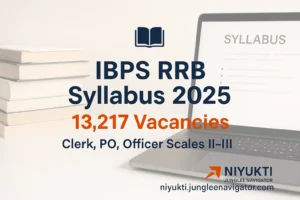Category- Syllabus
This category is your one-stop shop for accessing detailed syllabi for a wide range of government exams. We understand that having a clear understanding of the syllabus is crucial for effective exam preparation. That's why we provide comprehensive syllabus PDFs and exam pattern information to help you succeed.
We cover syllabi for exams conducted by:
- UPSC: Civil Services Exam, NDA, CDS, IFS, and other exams.
- SSC: CGL, CHSL, MTS, CPO, Stenographer, JE, and other exams.
- Banking: IBPS PO, Clerk, SBI PO, Clerk, RBI Grade B, and other bank exams.
- Railways: RRB NTPC, Group D, and other railway recruitment exams.
- Teaching: CTET, State TETs, and other teaching exams.
- Defense: NDA, CDS, AFCAT, and other defense entrance exams.
- Other Recruitment Agencies: Syllabi for exams conducted by various state and central government agencies.
Why is the syllabus important?
- Roadmap to Success: The syllabus provides a clear roadmap for your exam preparation, outlining the topics and subjects you need to cover.
- Effective Planning: It helps you plan your study schedule effectively and allocate time to different subjects based on their weightage.
- Focused Study: By understanding the syllabus, you can focus your study efforts on the most important areas and avoid wasting time on irrelevant topics.
- Resource Selection: The syllabus helps you choose the right study materials and resources that align with the exam requirements.
FAQ
1. What is a syllabus?
A syllabus is a document that outlines the topics and subjects covered in an exam. It provides a framework for your preparation and helps you understand the scope of the exam.
2. How can I find the syllabus for my exam?
You can find the syllabus for your exam on this page by searching for the exam name or browsing through the syllabus listings.
3. Are the syllabi available in different languages?
The availability of syllabi in different languages depends on the exam conducting body. We provide information on the available languages for each syllabus whenever possible.
4. What if I can’t find the syllabus for my exam?
If you’re unable to find the syllabus for your exam, it might not be publicly available yet, or we might not have it in our database yet. You can contact us to request a syllabus, and we’ll do our best to add it to our collection.
5. How often are syllabi updated?
Syllabi can be updated periodically by the exam conducting bodies. We strive to keep our syllabus collection up-to-date and reflect the latest changes.
6. What is the difference between a syllabus and an exam pattern?
The syllabus outlines the topics and subjects covered in the exam, while the exam pattern describes the format of the exam, including the types of questions, marking scheme, and duration.
7. Where can I find the exam pattern for my exam?
You can usually find the exam pattern along with the syllabus on the official notification or website of the exam conducting body. We also provide exam pattern information whenever available.
8. How can I use the syllabus to create a study plan?
You can use the syllabus to break down your study into manageable chunks, prioritize topics based on their weightage, and allocate time for each subject.
9. What are some tips for effective syllabus analysis?
Analyze the syllabus to understand the weightage of different topics, identify your strengths and weaknesses, and prioritize your study accordingly.
10. Why is it important to stay updated with any changes in the syllabus?
Exam conducting bodies may update the syllabus from time to time. Staying updated with any changes ensures that you are studying the correct and most relevant topics.

